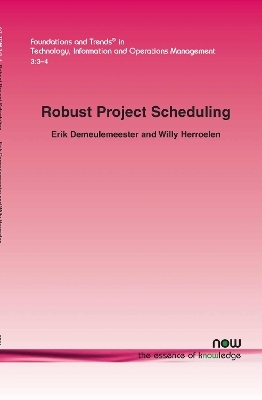
Robust Project Scheduling
Seiten
2011
|
1st Edition 2011
now publishers Inc (Verlag)
978-1-60198-434-0 (ISBN)
now publishers Inc (Verlag)
978-1-60198-434-0 (ISBN)
Scheduling and sequencing concerns the allocation of scarce resources to activities over time. The project scheduling problem involves the scheduling of project activities subject to precedence and/or resource constraints. This book reviews the fundamentals of robust project scheduling through the deployment of proactive/reactive procedures.
Scheduling and sequencing concerns the optimal allocation of scarce resources to activities over time. The project scheduling problem involves the scheduling of project activities subject to precedence and/or resource constraints. Robust Project Scheduling reviews the fundamentals of robust project scheduling through the deployment of proactive/reactive project scheduling procedures.
Proactive/reactive project scheduling procedures try to cope with schedule disruptions that may occur during project execution using a three stage-process: (a) the generation of a precedence and resource feasible baseline schedule, (b) protecting the baseline schedule against disruptions that may occur during project execution, and (c) deploying a reactive scheduling procedure to repair the baseline schedule during project execution when needed. The authors elaborate on the three-stage scheduling process in this text. Chapter 2 examines Temporal scheduling, the generation of precedence feasible schedules using CPM or PERT. Chapter 3 focuses on the resource management issue and the state-of-the-art in generating baseline schedules that are not only precedence but also resource feasible. In Chapter 4, the authors focus on project scheduling under uncertainty. Procedures for protecting baseline schedules against time uncertainty are dealt with in Chapter 5. Proactive project scheduling under renewable resource uncertainty is covered in Chapter 6. Chapter 7 is devoted to a discussion of reactive scheduling procedures which can be launched when the baseline schedule breaks and needs to be repaired. Chapter 8 revisits the material discussed in previous chapters, reviews our major findings and identifies some future research areas. Robust Project Scheduling is aimed at the ""informed newcomer"".
Material currently dispersed over numerous research publications is brought together within a unified comprehensive framework. Recent research findings that were not yet covered in previously published survey articles are discussed in sufficient depth. This should not only allow the reader to grasp the state-of-the-art in proactive/reactive project scheduling, but should also reveal potential new directions for fruitful research.
Scheduling and sequencing concerns the optimal allocation of scarce resources to activities over time. The project scheduling problem involves the scheduling of project activities subject to precedence and/or resource constraints. Robust Project Scheduling reviews the fundamentals of robust project scheduling through the deployment of proactive/reactive project scheduling procedures.
Proactive/reactive project scheduling procedures try to cope with schedule disruptions that may occur during project execution using a three stage-process: (a) the generation of a precedence and resource feasible baseline schedule, (b) protecting the baseline schedule against disruptions that may occur during project execution, and (c) deploying a reactive scheduling procedure to repair the baseline schedule during project execution when needed. The authors elaborate on the three-stage scheduling process in this text. Chapter 2 examines Temporal scheduling, the generation of precedence feasible schedules using CPM or PERT. Chapter 3 focuses on the resource management issue and the state-of-the-art in generating baseline schedules that are not only precedence but also resource feasible. In Chapter 4, the authors focus on project scheduling under uncertainty. Procedures for protecting baseline schedules against time uncertainty are dealt with in Chapter 5. Proactive project scheduling under renewable resource uncertainty is covered in Chapter 6. Chapter 7 is devoted to a discussion of reactive scheduling procedures which can be launched when the baseline schedule breaks and needs to be repaired. Chapter 8 revisits the material discussed in previous chapters, reviews our major findings and identifies some future research areas. Robust Project Scheduling is aimed at the ""informed newcomer"".
Material currently dispersed over numerous research publications is brought together within a unified comprehensive framework. Recent research findings that were not yet covered in previously published survey articles are discussed in sufficient depth. This should not only allow the reader to grasp the state-of-the-art in proactive/reactive project scheduling, but should also reveal potential new directions for fruitful research.
1. Introduction. 2. Temporal scheduling. 3. The resource-constrained project scheduling problem. 4. Project scheduling under uncertainty. 5. Proactive project scheduling under activity duration uncertainty. 6. Proactive scheduling under renewable resource uncertainty. 7. Reactive project scheduling and disruption management. 8. Conclusions and future research avenues. References.
| Erscheint lt. Verlag | 30.6.2011 |
|---|---|
| Reihe/Serie | Foundations and Trends® in Technology, Information and Operations Management |
| Verlagsort | Hanover |
| Sprache | englisch |
| Maße | 156 x 234 mm |
| Gewicht | 273 g |
| Themenwelt | Technik |
| Wirtschaft ► Betriebswirtschaft / Management ► Logistik / Produktion | |
| Wirtschaft ► Betriebswirtschaft / Management ► Projektmanagement | |
| ISBN-10 | 1-60198-434-0 / 1601984340 |
| ISBN-13 | 978-1-60198-434-0 / 9781601984340 |
| Zustand | Neuware |
| Haben Sie eine Frage zum Produkt? |
Mehr entdecken
aus dem Bereich
aus dem Bereich
Grundlagen - Spezialthemen - Übungen
Buch | Softcover (2022)
Springer Gabler (Verlag)
39,99 €


